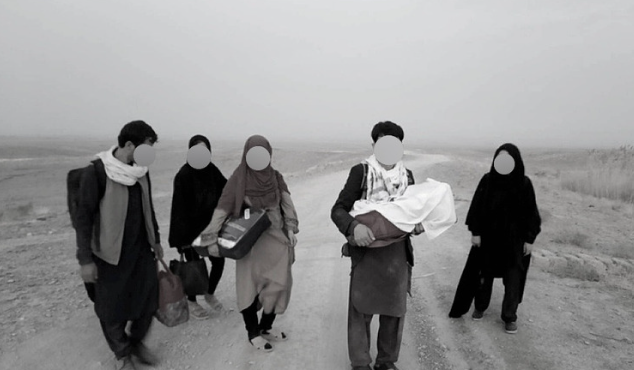According to UNHCR’s statistics, Afghanistan ranks as the world’s largest origin of refugees and asylum seekers.
Notably, Pakistan and Iran both stand among the top 5 countries globally in hosting refugees, accommodating at least 90% of the Afghan refugee population.
In the last few months, Pakistan has cracked down severely on Afghan refugees residing in Pakistan.
Based on official reports released by various zonal police officers between September 9-13, more than 540 refugees living without legal status were arrested by law enforcement agencies. Police have been arresting Afghans, even those with Proof of Registration Cards (PoR) and Afghan Citizenship Cards (ACC), and releasing some only after taking bribes.
The Pakistani government plans to resume deporting undocumented Afghan migrants from Punjab province starting April 15, 2024.
As Pakistan is not a signatory to the 1951 Geneva Convention and its 1967 Protocol relating to the Status of Refugees, Afghan refugees are struggling to find security despite obtaining proof of identification cards. At present, an Afghan may be considered for resettlement if they are recognized as a refugee under the UNHCR, receive Refugee Status Determination (RSD), or if an Afghan national holds a Proof of Registration Card (PoR).
However, many Afghan refugees lack the ability to obtain either identification card. Even those who manage to stay in Pakistan by registering with the UNHCR often face challenges, as their stay is not always ‘understood or respected by security forces.’
Furthermore, UNHCR registration presents various limitations for Afghans; while they can rent properties, register births, and access health and education services, these privileges usually ‘requires intervention by the UNHCR and is unattainable for many.’ Those who do not have have PoR, ACC, RSD, or Pakistani visas, are in breach of the Foreigners Act, 1946. This leaves them vulnerable to imprisonment, detention, or deportation.
PAKISTAN POST 2021 TALIBAN TAKEOVER
Due to the fall of the Taliban in August 2021, Pakistan tightened their borders to dissuade Afghan refugees from crossing, threatening to return those who attempted to cross without valid visas. Philoi has conducted a survey of Christian Afghan families currently residing in Pakistan, gathering data on their UNHCR registration experience.
- 60% of those interviewed had claimed to register with the UNHCR or with SHARP (Society for Human Rights and Prisoners’ Aid).
- Out of those who had registered, 42% had completed their biometrics, 10% gained Refugee Status Determination, and the remainder were not approved.
- 39% did not declare they were Christian (when they were adherent in the faith).
- 63% were concerned that the UNHCR knew about their Christian faith.
- 30% did not declare their faith because they were afraid.
- 12% of those who did declare they were Christians were met with shock, disbelief, and anger by officials.
When we asked about persecution, an overwhelming 73% said they were being persecuted in Pakistan.
- 53% of persecution came from Muslim communities/family.
- 14% of persecution came from Pakistani police or authorities.
- 9% remained Christian in secret for fear of persecution.
Statements from different Afghan refugees residing in Pakistan, 2023:
“I can’t believe or trust the UNHCR workers.”
“We are called infidels here. We also feat that the Taliban have sympathisers in the UN and may let them know our location.”
“When we told them that we were Christians, they baulked at us. They were not happy, but still continued with the biometrics. This happened when we first registered as well…”
“We are afraid that that the Taliban would find out who and where we are, for us and my extended family, they have us on their list.”
An overwhelming 82% do not receive any welfare assistance, and the remainder that do receive help are relying on individuals, NGOs, foreigners, and churches to support them.
93% do not have access to schooling, nor medical access.
References sourced from DFAT Country Information, Afghanistan 2022.

